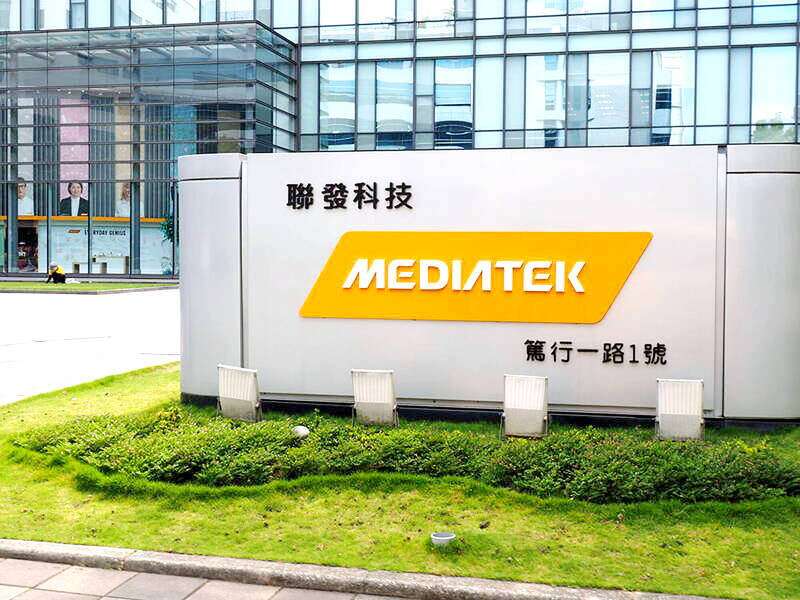MediaTek Inc (聯發科) on Wednesday launched a new flagship smartphone chip, Dimensity 9400, made with Taiwan Semiconductor Manufacturing Co’s (TSMC, 台積電) enhanced 3-nanometer technology, aiming to bring more artificial intelligence (AI) applications to edge devices like phones.
The Dimensity 9400 is the second smartphone chip using TSMC’s second-generation 3-nanometer technology, after Apple Inc’s A18 Pro chip for the new iPhone 16 series.
The new mobile chip has 28 percent more transistors, offers up to 80 percent faster large language model performance and is up to 35 percent more power-efficient than its predecessor, Dimensity 9300, MediaTek said.

Photo:EPA-EFE
Chinese smartphone makers Xiaomi Corp (小米), Oppo Mobile Telecommunications Corp (歐珀) and Vivo Communication Technology Co (維沃) are among the first-wave adopters of the new chip in their new premium models, while Samsung Electronics Co is to adopt the Dimensity 9400 for its Galaxy S25 phone rather than the Samsung-designed Exynos chip or Qualcomm Inc’s Snapdragon 8 Gen 4 chip.
New smartphones featuring the Dimensity 9400 are expected to hit stores later this quarter, companies said.
“The Dimensity 9400 will continue furthering our mission to be the enablers of AI, supporting powerful applications that anticipate users’ needs and adapt to their preferences,” MediaTek president Joe Chen (陳冠州) said.
MediaTek on Wednesday also reported that revenue last month grew by 23.83 percent year-on-year and was up 7.58 percent month-on-month to NT$44.68 billion (US$1.39 billion).
That brought the company’s third-quarter revenue to NT$131.82 billion, up 3.58 percent from NT$127.27 billion the previous quarter and within the company’s forecast of NT$123.5 billion to NT$132.4 billion.
In the first nine months of this year, revenue totaled NT$392.54 billion, up 29.18 percent from NT$303.88 billion in the same period last year.
MediaTek has said that it expects flagship chip revenue to grow about 50 percent this year compared with last year and hopes the launch of the Dimensity 9400 would help extend its revenue growth momentum into next year.

United Microelectronics Corp (UMC, 聯電) expects its addressable market to grow by a low single-digit percentage this year, lower than the overall foundry industry’s 15 percent expansion and the global semiconductor industry’s 10 percent growth, the contract chipmaker said yesterday after reporting the worst profit in four-and-a-half years in the fourth quarter of last year. Growth would be fueled by demand for artificial intelligence (AI) servers, a moderate recovery in consumer electronics and an increase in semiconductor content, UMC said. “UMC’s goal is to outgrow our addressable market while maintaining our structural profitability,” UMC copresident Jason Wang (王石) told an online earnings

Gudeng Precision Industrial Co (家登精密), the sole extreme ultraviolet (EUV) pod supplier to Taiwan Semiconductor Manufacturing Co (TSMC, 台積電), is aiming to expand revenue to NT$10 billion (US$304.8 million) this year, as it expects the artificial intelligence (AI) boom to drive demand for wafer delivery pods and pods used in advanced packaging technology. That suggests the firm’s revenue could grow as much as 53 percent this year, after it posted a 28.91 percent increase to NT$6.55 billion last year, exceeding its 20 percent growth target. “We usually set an aggressive target internally to drive further growth. This year, our target is to

The TAIEX ended the Year of the Dragon yesterday up about 30 percent, led by contract chipmaker Taiwan Semiconductor Manufacturing Co (TSMC, 台積電). The benchmark index closed up 225.40 points, or 0.97 percent, at 23,525.41 on the last trading session of the Year of the Dragon before the Lunar New Year holiday ushers in the Year of the Snake. During the Year of the Dragon, the TAIEX rose 5,429.34 points, the highest ever, while the 30 percent increase in the year was the second-highest behind only a 30.84 percent gain in the Year of the Rat from Jan. 25, 2020, to Feb.

Cryptocurrencies gave a lukewarm reception to US President Donald Trump’s first policy moves on digital assets, notching small gains after he commissioned a report on regulation and a crypto reserve. Bitcoin has been broadly steady since Trump took office on Monday and was trading at about US$105,000 yesterday as some of the euphoria around a hoped-for revolution in cryptocurrency regulation ebbed. Smaller cryptocurrency ether has likewise had a fairly steady week, although was up 5 percent in the Asia day to US$3,420. Bitcoin had been one of the most spectacular “Trump trades” in financial markets, gaining 50 percent to break above US$100,000 and